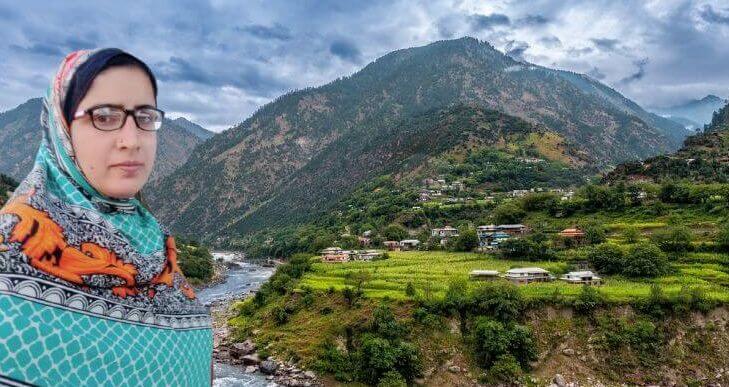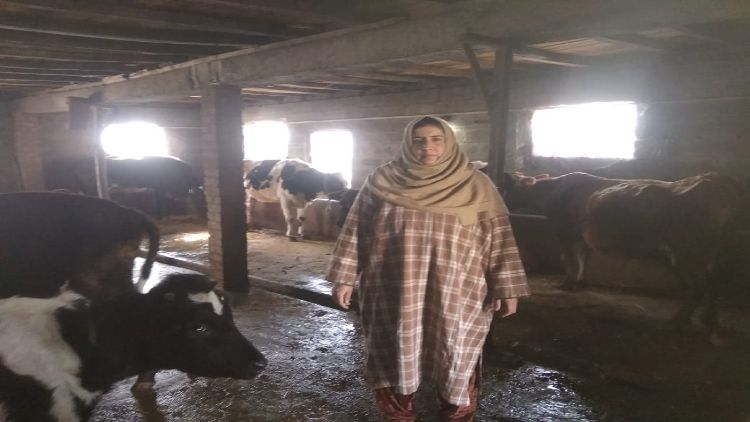
Aasha Khosa
In her growing years in Muzaffarabad, POK, Sumiya Sadaf was often told that one day she would have to marry someone and move to her ‘real home’ with her husband.
Years later, when destiny brought her to Kupwara, north Kashmir, right across the Line of control that divides Jammu and Kashmir, to her ‘home,’ she thought she had settled for good. Little did she know that her life would get entangled in the vagaries of the Indo-Pak relations over Kashmir.
Sumiya came to Kashmir as the bride of Abdul Majeed who, in his school days, had crossed over to POK to get trained as a militant of the then locally- dominant Muslim Janbaaz Force group. He was enrolled for arms training and indoctrination camp in Muzaffarabad purportedly run by the ISI.
“I lost interest soon and left the camp. However I continued to in Muzaffarabad as a refugee,” Majeed told Awaz the voice. He admitted he was receiving a stipend of Rs 5,000 and other relief to manage his life. He graduated from local university, married Sumiya and the couple had their dfirst two of the four children in POK.

Sumiya in her cattle shed at Battergam
A decade ago, Majeed and Sumiya moved to Battergam, former’s village in north Kashmir. “My wife thinks differently; we had to resume life and instead of accepting doles, she decided to start our own enterprise.” No wonder the couple owns a dairy farm which produces 150 litres of milk per day and a poultry form that gives them 200 eggs per day.
The couple has become a role model of self-help and enterprise for the area that has scanty economic opportunities.
Sumiya mingled with women around and helped them avail of the opportunities offered by government schemes. “Honestly, back home in Muzaffarabad, we have never heard of any government scheme and here (in Kashmir) people don’t know about the plethora of these that the government offers,” Sumiya told Awaz the Voice over phone.
She mentors and guides many self-help groups under the official scheme UMEED.
She was handpicked by the administration to speak with Prime Minister Narendra Modi in his digital meeting with grassroot entrepreneurs. Buoyed by the recognition and also smelling an opportunity to further her interest in public life, Sumiya fought the District development Council (DDC) elections from her ‘home’ Battergaam.
“I thought by getting elected to DDC, I would be in a better position to help women and poor people connect with the government schemes,” she said. “The lacunae with government schemes are that people either don’t know about them or the officials demand bribe for extending the same to the people,” she said.
She is yet to get the subsidy of Rs 3 lakh for the cowshed and poultry farm she built under a government scheme for rural enterprise. “They ask for a 10 per cent cut for each lakh and the word bribery doesn’t exist in my book,” she said.
However, in the nick of the time, her dream of making it in the service of people got stuck in the complex relations of two neighbours. As the counting of votes for her constituency was in progress, the presiding officer abruptly stopped it. The administration had suddenly realised the legal implications of Sumiya not being an India contesting elections.
When this reporter asked Sumiya why she didn’t apply for Indian citizenship that alone could validate her Permanent Resident Certificate (PRC) of the erstwhile J&K State, she said she never had felt it was needed. The PRC was a must have for J&K resident before August 5, 2019; however, it was subject to a condition the holder should be an Indian national. Since Samiya, as resident of occupied Kashmir, is presumed as a Pakistani passport holder, she can’t be even treated as ‘state subject’ of the undivided Kashmir.
“Aren’t we, the girls, told that our husband’s home is your home; therefore, I am an Indian by marriage,” she told Awaz the Voice on phone from Battergam.
The governments however don’t go by conventions of society. The question mark on Sumiya’s citizenship has shifted focus on the fate of some 400 Pakistani women who have come to Kashmir as wives of former militants through different rehabilitation schemes for the prodigal sons.
Since their citizenship status is not clear and they have no travel documents, these women have been demanding travel documents to visit their families in Pakistan.
Former militants like Majeed who were stuck in POK without papers had returned – mostly with their families – under rehabilitation policy via Wagah, Delhi airport and two cross LOC bus routes in J&K. However, Sumiya’s husband came via Nepal border. Besides, although the wives and children of the returnees were allowed into India, there was no clarity on their citizenship.
“They will be treated as per the land of the land,” the rehabilitation policy of J&K government had said.
